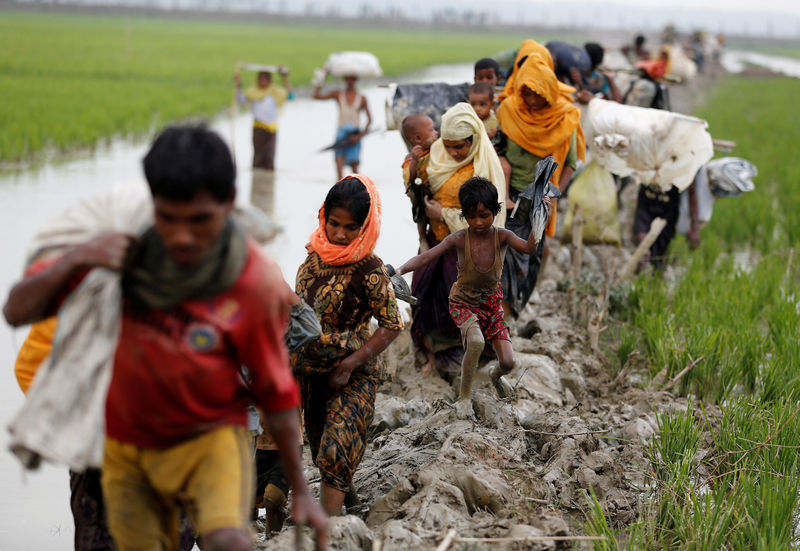By Simon Lewis and Wa Lone
COX'S BAZAR, Bangladesh/YANGON (Reuters) - Two blasts rocked a Myanmar area near the Bangladeshi border on Monday, accompanied by the sound of gunfire and thick black smoke, as violence that has sent nearly 90,000 Muslim Rohingya fleeing to Bangladesh showed no sign of easing.
Bangladeshi border guards said a woman lost a leg from a blast about 50 metres inside Myanmar and was carried into Bangladesh to get treatment. Reuters reporters heard explosions and saw a black smoke rising near a Myanmar village.
The latest violence in Myanmar's northwestern Rakhine state began on Aug. 25, when Rohingya insurgents attacked dozens of police posts and an army base.
The ensuing clashes and a military counter-offensive have killed at least 400 people and triggered the exodus of villagers to Bangladesh.
The treatment of Buddhist-majority Myanmar's roughly 1.1 million Muslim Rohingya is the biggest challenge facing leader Aung San Suu Kyi, accused by Western critics of not speaking out for the minority that has long complained of persecution.
The Nobel Peace Prize laureate has come under increasing diplomatic pressure from countries with large Muslim populations such as Bangladesh, Turkey, Indonesia and Pakistan to protect Rohingya civilians.
Myanmar says its security forces are fighting a legitimate campaign against "terrorists" responsible for a string of attacks on police posts and the army since last October.
On Monday, Reuters reporters saw fires and heard gunshots before the explosions near the Myanmar village of Taung Pyo Let Way. Bangladeshi border guards believe the injured woman stepped on an anti-personnel mine, although that was not confirmed.
A Myanmar military source said security forces still had difficulty penetrating the remote northern part of Maungdaw region - close to the Bangladeshi border.
'NO FOOD ... NO TREATMENT'
Myanmar officials blamed Rohingya militants for the burning of homes and civilian deaths but rights monitors and Rohingya fleeing to neighbouring Bangladesh say the Myanmar army is trying to force Rohingya out with a campaign of arson and killings.
The number of those crossing the border into Bangladesh - 87,000 - surpassed the number who escaped Myanmar after a series of much smaller insurgent attacks in October that set off a military operation beset by accusations of serious human rights abuses.
The newest estimate, based on calculations by U.N. workers in the Bangladeshi border district of Cox's Bazar, takes to about 174,000 the total number of Rohingya who have sought refuge in Bangladesh since October.
The new arrivals have strained aid agencies and communities already helping hundreds of thousands of refugees from previous spasms of violence in Myanmar.
"We are trying to build houses here, but there isn't enough space," said Mohammed Hussein, 25, who was still looking for a place to stay after fleeing Myanmar four days ago.
"No non-government organisations came here. We have no food. Some women gave birth on the roadside. Sick children have no treatment."
An unofficial camp for Rohingya refugees that sprang up after the October attacks is being dramatically expanded.
Hundreds of Rohingya milled beside the road while others slung tarpaulins over bamboo frames to make shelters against the monsoon rain.
Among new arrivals, about 16,000 are school-age children and more than 5,000 are under the age of five who need vaccine coverage, aid workers said over the weekend.
The number of unaccompanied children was high and many were "traumatized and hungry", they said.
Bangladesh officials have said at least 53 bodies have either washed up on Bangladeshi shores or have been found in the Naf River, which separates the two countries, many with bullet or knife wounds.
INTERNATIONAL ANGER
Turkish President Tayyip Erdogan, who said on Friday that violence against Myanmar's Muslims amounted to genocide, last week called Bangladesh's President Abdul Hamid to offer help in sheltering the Rohingya, Dhaka said.
Indonesian Foreign Minister Retno Marsudi met Suu Kyi and other officials in Myanmar on Monday, to urge a halt to the violence.
Indonesia has the world's largest Muslim population. A petrol bomb was thrown at the Myanmar embassy in the Indonesian capital, Jakarta, on Sunday.
Suu Kyi's office said Marsudi expressed the Indonesian government's "support of the activities of the Myanmar government for the stability, peace and development of Rakhine state".
They also discussed humanitarian aid and the two countries would collaborate for the development of the state, Suu Kyi's office said without giving further details.
There were more anti-Myanmar protests in Jakarta on Monday.
Malala Yousafzai, the youngest winner of the Nobel Peace Prize, called on Suu Kyi to condemn the "shameful" treatment of the Rohingya, saying "the world is waiting" for her to speak out.
In addition to tens of thousands of Rohingya, more than 11,700 "ethnic residents" had been evacuated from northern Rakhine state, the Myanmar government has said, referring to non-Muslims.

The army said on Sunday Rohingya insurgents had set fire to monasteries, images of Buddha as well as schools and houses in the north of Rakhine state. It posted images of destroyed Buddha statues.